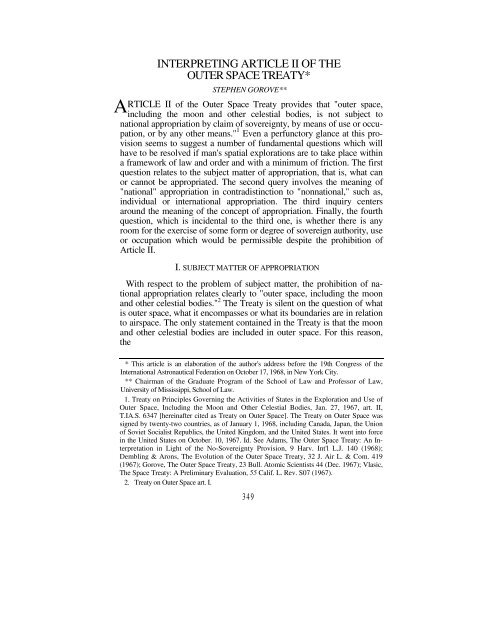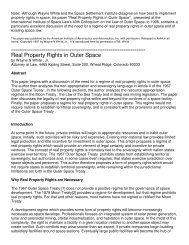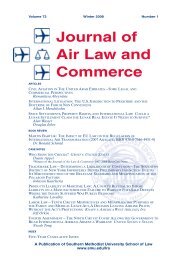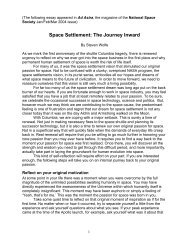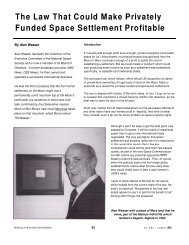interpreting article ii of the outer space treaty - The Space Settlement ...
interpreting article ii of the outer space treaty - The Space Settlement ...
interpreting article ii of the outer space treaty - The Space Settlement ...
Create successful ePaper yourself
Turn your PDF publications into a flip-book with our unique Google optimized e-Paper software.
A<br />
INTERPRETING ARTICLE II OF THE<br />
OUTER SPACE TREATY*<br />
STEPHEN GOROVE**<br />
RTICLE II <strong>of</strong> <strong>the</strong> Outer <strong>Space</strong> Treaty provides that "<strong>outer</strong> <strong>space</strong>,<br />
including <strong>the</strong> moon and o<strong>the</strong>r celestial bodies, is not subject to<br />
national appropriation by claim <strong>of</strong> sovereignty, by means <strong>of</strong> use or occupation,<br />
or by any o<strong>the</strong>r means." 1 Even a perfunctory glance at this provision<br />
seems to suggest a number <strong>of</strong> fundamental questions which will<br />
have to be resolved if man's spatial explorations are to take place within<br />
a framework <strong>of</strong> law and order and with a minimum <strong>of</strong> friction. <strong>The</strong> first<br />
question relates to <strong>the</strong> subject matter <strong>of</strong> appropriation, that is, what can<br />
or cannot be appropriated. <strong>The</strong> second query involves <strong>the</strong> meaning <strong>of</strong><br />
"national" appropriation in contradistinction to "nonnational," such as,<br />
individual or international appropriation. <strong>The</strong> third inquiry centers<br />
around <strong>the</strong> meaning <strong>of</strong> <strong>the</strong> concept <strong>of</strong> appropriation. Finally, <strong>the</strong> fourth<br />
question, which is incidental to <strong>the</strong> third one, is whe<strong>the</strong>r <strong>the</strong>re is any<br />
room for <strong>the</strong> exercise <strong>of</strong> some form or degree <strong>of</strong> sovereign authority, use<br />
or occupation which would be permissible despite <strong>the</strong> prohibition <strong>of</strong><br />
Article II.<br />
I. SUBJECT MATTER OF APPROPRIATION<br />
With respect to <strong>the</strong> problem <strong>of</strong> subject matter, <strong>the</strong> prohibition <strong>of</strong> national<br />
appropriation relates clearly to "<strong>outer</strong> <strong>space</strong>, including <strong>the</strong> moon<br />
and o<strong>the</strong>r celestial bodies." 2 <strong>The</strong> Treaty is silent on <strong>the</strong> question <strong>of</strong> what<br />
is <strong>outer</strong> <strong>space</strong>, what it encompasses or what its boundaries are in relation<br />
to air<strong>space</strong>. <strong>The</strong> only statement contained in <strong>the</strong> Treaty is that <strong>the</strong> moon<br />
and o<strong>the</strong>r celestial bodies are included in <strong>outer</strong> <strong>space</strong>. For this reason,<br />
<strong>the</strong><br />
* This <strong>article</strong> is an elaboration <strong>of</strong> <strong>the</strong> author's address before <strong>the</strong> 19th Congress <strong>of</strong> <strong>the</strong><br />
International Astronautical Federation on October 17, 1968, in New York City.<br />
** Chairman <strong>of</strong> <strong>the</strong> Graduate Program <strong>of</strong> <strong>the</strong> School <strong>of</strong> Law and Pr<strong>of</strong>essor <strong>of</strong> Law,<br />
University <strong>of</strong> Mississippi, School <strong>of</strong> Law.<br />
1. Treaty on Principles Governing <strong>the</strong> Activities <strong>of</strong> States in <strong>the</strong> Exploration and Use <strong>of</strong><br />
Outer <strong>Space</strong>, Including <strong>the</strong> Moon and O<strong>the</strong>r Celestial Bodies, Jan. 27, 1967, art. II,<br />
T.IA.S. 6347 [hereinafter cited as Treaty on Outer <strong>Space</strong>]. <strong>The</strong> Treaty on Outer <strong>Space</strong> was<br />
signed by twenty-two countries, as <strong>of</strong> January 1, 1968, including Canada, Japan, <strong>the</strong> Union<br />
<strong>of</strong> Soviet Socialist Republics, <strong>the</strong> United Kingdom, and <strong>the</strong> United States. It went into force<br />
in <strong>the</strong> United States on October. 10, 1967. Id. See Adams, <strong>The</strong> Outer <strong>Space</strong> Treaty: An Interpretation<br />
in Light <strong>of</strong> <strong>the</strong> No-Sovereignty Provision, 9 Harv. Int'l L.J. 140 (1968);<br />
Dembling & Arons, <strong>The</strong> Evolution <strong>of</strong> <strong>the</strong> Outer <strong>Space</strong> Treaty, 32 J. Air L. & Com. 419<br />
(1967); Gorove, <strong>The</strong> Outer <strong>Space</strong> Treaty, 23 Bull. Atomic Scientists 44 (Dec. 1967); Vlasic,<br />
<strong>The</strong> <strong>Space</strong> Treaty: A Preliminary Evaluation, 55 Calif. L. Rev. S07 (1967).<br />
2. Treaty on Outer <strong>Space</strong> art. I.<br />
349
350 FORDHAM LAW REVIEW [Vol. 37<br />
prohibition regarding national appropriation would unquestionably extend to<br />
<strong>the</strong> moon and o<strong>the</strong>r celestial bodies. Whe<strong>the</strong>r or not <strong>the</strong> prohibition<br />
would extend to <strong>outer</strong> <strong>space</strong> in its totality or only to part <strong>of</strong> it, or would<br />
relate to <strong>the</strong> moon or a celestial body as a whole or only to a part <strong>of</strong> it, are<br />
fur<strong>the</strong>r significant questions. By common sense interpretation <strong>the</strong> prohibition<br />
could not very well relate to <strong>outer</strong> <strong>space</strong> as a whole since no one<br />
could at present appropriate <strong>outer</strong> <strong>space</strong> as a whole but only a part <strong>of</strong> it<br />
Ins<strong>of</strong>ar as <strong>the</strong> moon and o<strong>the</strong>r celestial bodies are concerned, <strong>the</strong> prohibition<br />
could extend to <strong>the</strong> whole entity if national appropriation <strong>of</strong> <strong>the</strong> whole is<br />
indeed possible. But even in relation to <strong>the</strong> moon and o<strong>the</strong>r celestial bodies, it<br />
would appear by reasonable interpretation that <strong>the</strong> prohibition would also<br />
cover acquisition <strong>of</strong> a part <strong>of</strong> <strong>the</strong> moon or o<strong>the</strong>r celestial body. Any<br />
contrary interpretation would seem to make <strong>the</strong> prohibition <strong>of</strong> national<br />
appropriation largely illusory.<br />
In relation to national acquisition <strong>of</strong> a part <strong>of</strong> <strong>outer</strong> <strong>space</strong>, fur<strong>the</strong>r<br />
questions may be raised. For example, does <strong>the</strong> prohibition extend to <strong>the</strong><br />
collection <strong>of</strong> dust p<strong>article</strong>s or o<strong>the</strong>r special elements during flight in <strong>outer</strong><br />
<strong>space</strong> Does <strong>the</strong> prohibition extend to <strong>the</strong> appropriation <strong>of</strong> cosmic rays,<br />
gases or <strong>the</strong> sun's energy, or to <strong>the</strong> collecting <strong>of</strong> mineral samples or<br />
precious metals on <strong>the</strong> moon or o<strong>the</strong>r celestial bodies Should <strong>the</strong> answer<br />
depend on <strong>the</strong> type <strong>of</strong> resource involved, or on its availability in unlimited<br />
(cosmic rays, meteorites, gases) or limited (minerals, metals) quantities or<br />
perhaps on its location<br />
In attempting to give answers to <strong>the</strong>se questions, it may be pointed out,<br />
first <strong>of</strong> all, that, in <strong>the</strong> absence <strong>of</strong> some special circumstance, little would be<br />
gained by insisting on <strong>the</strong> nonappropriation <strong>of</strong> resources such as cosmic<br />
rays or gases, which are available in inexhaustible quantities. At <strong>the</strong> same<br />
time, <strong>the</strong> Treaty as it stands seems to make little allowance for national<br />
acquisition <strong>of</strong> exhaustible spatial resources.<br />
With respect to location, it could be argued that if any parts <strong>of</strong> <strong>outer</strong><br />
<strong>space</strong>, including <strong>the</strong> moon and o<strong>the</strong>r celestial bodies, were found on <strong>the</strong><br />
earth, <strong>the</strong>y would not be subject to <strong>the</strong> prohibition <strong>of</strong> national appropriation<br />
since <strong>the</strong>y would become part and parcel <strong>of</strong> <strong>the</strong> earth. Under a strict<br />
interpretation it may also be argued that <strong>the</strong> prohibition extends to <strong>the</strong> resource<br />
irrespective <strong>of</strong> its location. However, it might be preferable to<br />
distinguish between elements <strong>of</strong> <strong>outer</strong> <strong>space</strong> which have reached <strong>the</strong> earth
1969 OUTER SPACE TREATY 351<br />
as a result <strong>of</strong> natural causes and those which have done so through human<br />
intervention. In <strong>the</strong> first instance national appropriation would not be<br />
prohibited, whereas in <strong>the</strong> second example <strong>the</strong> prohibition would apply.<br />
Thus, a meteorite falling on <strong>the</strong> earth could be appropriated whereas a<br />
precious stone or metal brought to <strong>the</strong> earth from <strong>outer</strong> <strong>space</strong> could not be<br />
a subject <strong>of</strong> national appropriation.<br />
Regarding <strong>the</strong> jurisdictional boundaries <strong>of</strong> <strong>outer</strong> <strong>space</strong>, particularly <strong>the</strong><br />
dividing line between air<strong>space</strong> and <strong>outer</strong> <strong>space</strong>, we seem to know a little<br />
more now than we knew at <strong>the</strong> time <strong>of</strong> <strong>the</strong> first Colloquium on <strong>the</strong> Law <strong>of</strong><br />
Outer <strong>Space</strong> back in 1958. At that time it did not appear with certainty that<br />
nation states would not object to <strong>the</strong> orbiting <strong>of</strong> foreign <strong>space</strong> instrumentalities<br />
over and above <strong>the</strong>ir territories. Today after more than a<br />
decade <strong>of</strong> spatial experiments, it can be said that an international custom<br />
seems to have sprung up which regards <strong>the</strong> area where <strong>space</strong> instrumentalities<br />
move in durable orbit as <strong>outer</strong> <strong>space</strong>. From this we also take for<br />
granted that anything above and beyond this area is also regarded as<br />
<strong>outer</strong> <strong>space</strong>. However, <strong>the</strong> more precise boundary line between air<strong>space</strong> and<br />
<strong>outer</strong> <strong>space</strong> is still left undetermined.<br />
II. NATIONAL APPROPRIATION<br />
Turning to <strong>the</strong> second question which involves <strong>the</strong> meaning <strong>of</strong> "national"<br />
appropriation, it has been suggested that only <strong>the</strong> United Nations<br />
acting on behalf <strong>of</strong> <strong>the</strong> world community as a whole, should be entitled to<br />
appropriate. 3 While fur<strong>the</strong>r developments in <strong>space</strong> law, by international<br />
custom or <strong>treaty</strong>, may eventually prohibit spatial appropriations by an<br />
individual or a chartered company or <strong>the</strong> European communities, <strong>the</strong><br />
Treaty in its present form appears to contain no prohibition regarding<br />
individual appropriation or acquisition by a private association or an<br />
international organization, even if o<strong>the</strong>r than <strong>the</strong> United Nations. Thus, at<br />
present, an individual acting on his own behalf or on behalf <strong>of</strong> ano<strong>the</strong>r<br />
individual or a private association or an international organization could<br />
lawfully appropriate any part <strong>of</strong> <strong>outer</strong> <strong>space</strong>, including <strong>the</strong> moon and<br />
o<strong>the</strong>r celestial bodies. Whe<strong>the</strong>r or not an ad hoc international organization<br />
could be created for <strong>the</strong> exclusive purpose <strong>of</strong> enabling it to appropriate<br />
3. See C. Jenks, <strong>Space</strong> Law 201 (196S).
352 FORDHAM LAW REVIEW [Vol. 37<br />
<strong>outer</strong> <strong>space</strong> is a delicate question. <strong>The</strong> answer may have to depend on<br />
<strong>the</strong> good faith <strong>of</strong> <strong>the</strong> parties.<br />
A fur<strong>the</strong>r question in relation to "national" appropriation is whe<strong>the</strong>r or<br />
not political subdivisions <strong>of</strong> a state, such as <strong>the</strong> states <strong>of</strong> a federal state,<br />
cities or municipalities may appropriate Under a strict interpretation, <strong>the</strong><br />
answers to <strong>the</strong>se questions would likely be in <strong>the</strong> negative even though<br />
an occasional court decision in o<strong>the</strong>r areas <strong>of</strong> <strong>the</strong> law mav support an<br />
affirmative position. 4<br />
III. THE CONCEPT OF APPROPRIATION<br />
With respect to <strong>the</strong> concept <strong>of</strong> appropriation <strong>the</strong> basic question is<br />
what constitutes "appropriation," as used in <strong>the</strong> Treaty, especially in<br />
contradistinction to casual or temporary use. <strong>The</strong> term "appropriation"<br />
is used most frequently to denote <strong>the</strong> taking <strong>of</strong> property for one's own<br />
or exclusive use with a sense <strong>of</strong> permanence. Under such interpretation<br />
<strong>the</strong> establishment <strong>of</strong> a permanent settlement or <strong>the</strong> carrying out <strong>of</strong> commercial<br />
activities by nationals <strong>of</strong> a country on a celestial body may<br />
constitute national appropriation if <strong>the</strong> activities take place under tie<br />
supreme authority (sovereignty) <strong>of</strong> <strong>the</strong> state. Short <strong>of</strong> this, if <strong>the</strong> state<br />
wields no exclusive authority or jurisdiction in relation to <strong>the</strong> area in<br />
question, <strong>the</strong> answer would seem to be in <strong>the</strong> negative, unless, <strong>the</strong><br />
nationals also use <strong>the</strong>ir individual appropriations as cover-ups for <strong>the</strong>ir<br />
state's activities.<br />
5 In this connection, it should be emphasized that <strong>the</strong><br />
word "appropriation" indicates a taking which involves something more<br />
than just a casual use. Thus a temporary occupation <strong>of</strong> a landing site or<br />
o<strong>the</strong>r area, just like <strong>the</strong> temporary or nonexclusive use <strong>of</strong> property,<br />
would not constitute appropriation. By <strong>the</strong> same token, any use involving<br />
consumption or taking with intention <strong>of</strong> keeping for one's own exclusive<br />
use would amount to appropriation.<br />
<strong>The</strong> question may also be asked whe<strong>the</strong>r or not <strong>the</strong> purpose <strong>of</strong> appropriation,<br />
that is whe<strong>the</strong>r it takes place in <strong>the</strong> name <strong>of</strong> science, for enrichment,<br />
or for any o<strong>the</strong>r purpose would have a bearing on <strong>the</strong> question <strong>of</strong> its<br />
lawfulness. Normally, <strong>the</strong> purpose <strong>of</strong> appropriation should have little<br />
4. See Sullivan v. Sao Paulo, 36 F. Supp. 503 (E.D.N.Y.), aff'd, 122 F.2d 35S (2d Cir.<br />
1941).<br />
5. Gorove, supra note 1, at 45.
1969 OUTER SPACE TREATY 353<br />
bearing on <strong>the</strong> prohibition except that to constitute appropriation, <strong>the</strong><br />
acquisition must be carried out for <strong>the</strong> purpose <strong>of</strong> one's own or exclusive use.<br />
However, since <strong>the</strong> Treaty proclaims freedom <strong>of</strong> scientific investigation in<br />
<strong>outer</strong> <strong>space</strong>, 6 <strong>the</strong>re seems to be some support for <strong>the</strong> argument that if <strong>the</strong><br />
appropriation takes place in <strong>the</strong> name <strong>of</strong> science or in <strong>the</strong> course <strong>of</strong> a<br />
scientific investigation in <strong>outer</strong> <strong>space</strong>, including <strong>the</strong> moon and o<strong>the</strong>r<br />
celestial bodies, such use would not be prohibited under <strong>the</strong> Treaty.<br />
None<strong>the</strong>less, if <strong>the</strong> proclaimed principle is taken literally, <strong>the</strong> same<br />
argument could not be used with equal force in a case where <strong>the</strong> scientific<br />
investigation was carried out on <strong>the</strong> earth. It is doubtful whe<strong>the</strong>r <strong>the</strong> Treaty<br />
intended such effect, but if it did not, it is unfortunate that it fails to make<br />
it clear. 7<br />
IV. SOVEREIGN AUTHORITY<br />
In relation to <strong>the</strong> question whe<strong>the</strong>r or not <strong>the</strong>re is any room for <strong>the</strong><br />
exercise <strong>of</strong> some form or degree <strong>of</strong> superior authority, jurisdiction, use or<br />
occupation in <strong>outer</strong> <strong>space</strong>, <strong>the</strong> answer would seem to be in <strong>the</strong> affirmative,<br />
since <strong>the</strong> Treaty prohibits <strong>the</strong> exercise <strong>of</strong> such authority, use or<br />
occupation only if it amounts to national appropriation. Under such interpretation,<br />
<strong>the</strong> temporary use <strong>of</strong> a spatial resource without <strong>the</strong> latter's<br />
transformation or deterioration may be permissible, whereas <strong>the</strong> consumption<br />
or destruction <strong>of</strong> a resource may not.<br />
Fur<strong>the</strong>rmore, ins<strong>of</strong>ar as <strong>the</strong> exercise <strong>of</strong> authority is concerned, <strong>the</strong> state<br />
on whose registry an object launched into <strong>space</strong> is carried must retain<br />
jurisdiction and control over such object, and over its personnel, while in<br />
<strong>outer</strong> <strong>space</strong> or on a celestial body. 8 <strong>The</strong> Treaty also makes it dear that <strong>the</strong><br />
states will be internationally responsible for national activities in <strong>outer</strong><br />
<strong>space</strong>, including <strong>the</strong> moon and o<strong>the</strong>r celestial bodies, irrespective <strong>of</strong> whe<strong>the</strong>r<br />
such activities are carried on by governmental or nongovernmental entities.<br />
In fact, <strong>the</strong> activities <strong>of</strong> nongovernmental entitities require authorization and<br />
continuing supervision by <strong>the</strong> state concerned. 8 <strong>The</strong> fact that some measure<br />
<strong>of</strong> at least temporary exclusive<br />
fi. See Treaty on Outer <strong>Space</strong> art. I, para. 3; Gorove, supra note 1, at 45.<br />
1. Gorove, supra note 1, at 45.<br />
8. Treaty on Outer <strong>Space</strong> art. VIII.<br />
9- Id. at art. V I.
354 FORDHAM LAW REVIEW [Vol. 37<br />
jurisdiction may be exercised over a particular area on <strong>the</strong> moon or<br />
o<strong>the</strong>r celestial bodies, such as a <strong>space</strong> station and its adjacent grounds is<br />
also apparent from Article XII which makes access by representatives <strong>of</strong> a<br />
foreign state contingent on reciprocity.<br />
It is not <strong>the</strong> purpose <strong>of</strong> <strong>the</strong> foregoing brief analysis to attempt to<br />
resolve <strong>the</strong> complex problems which may arise in connection with <strong>the</strong><br />
interpretation <strong>of</strong> Article II <strong>of</strong> <strong>the</strong> Outer <strong>Space</strong> Treaty. <strong>The</strong> purpose is<br />
ra<strong>the</strong>r to draw attention to <strong>the</strong> existence <strong>of</strong> <strong>the</strong>se problems which will<br />
have to be resolved if man's exploration <strong>of</strong> <strong>the</strong> cosmos is to be guarded by<br />
law and order.


